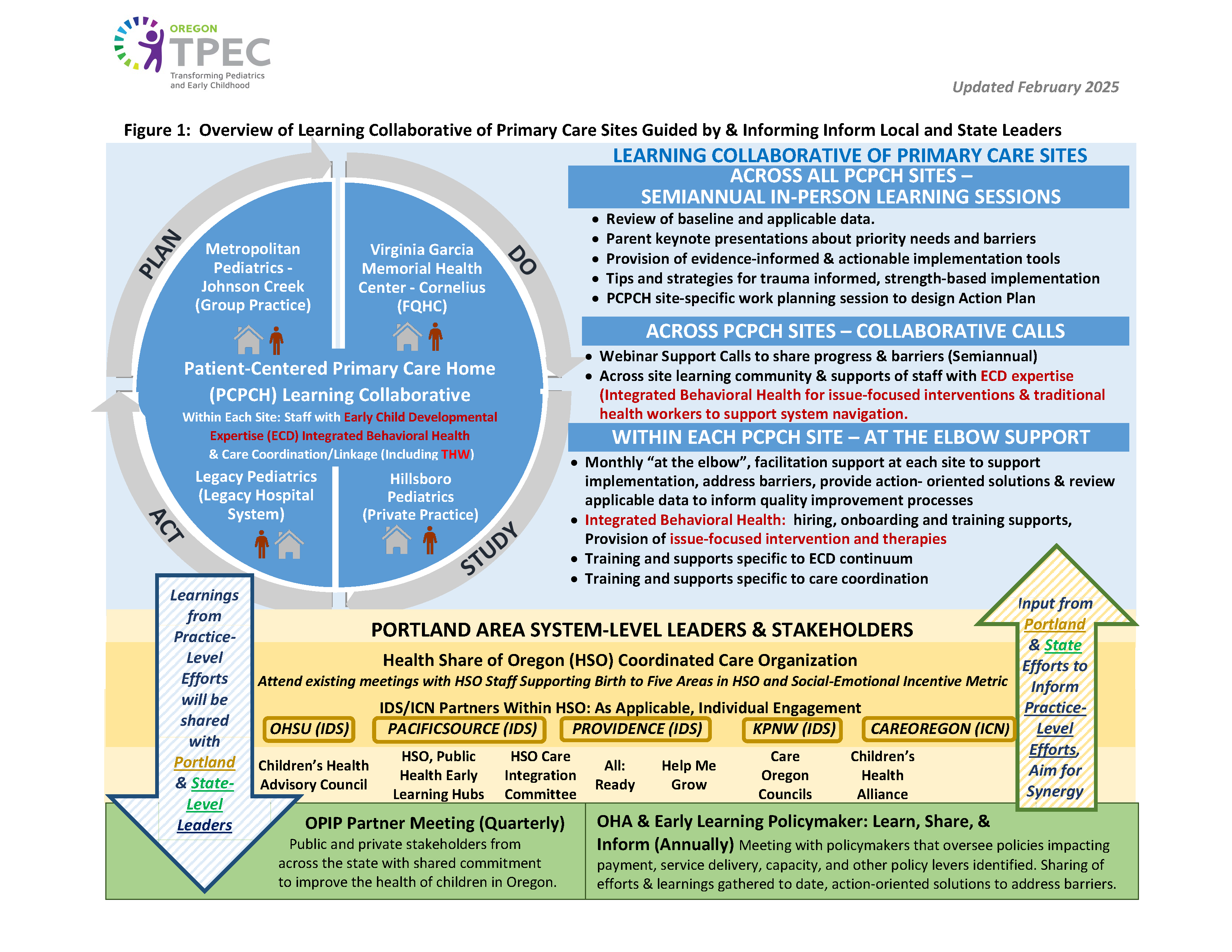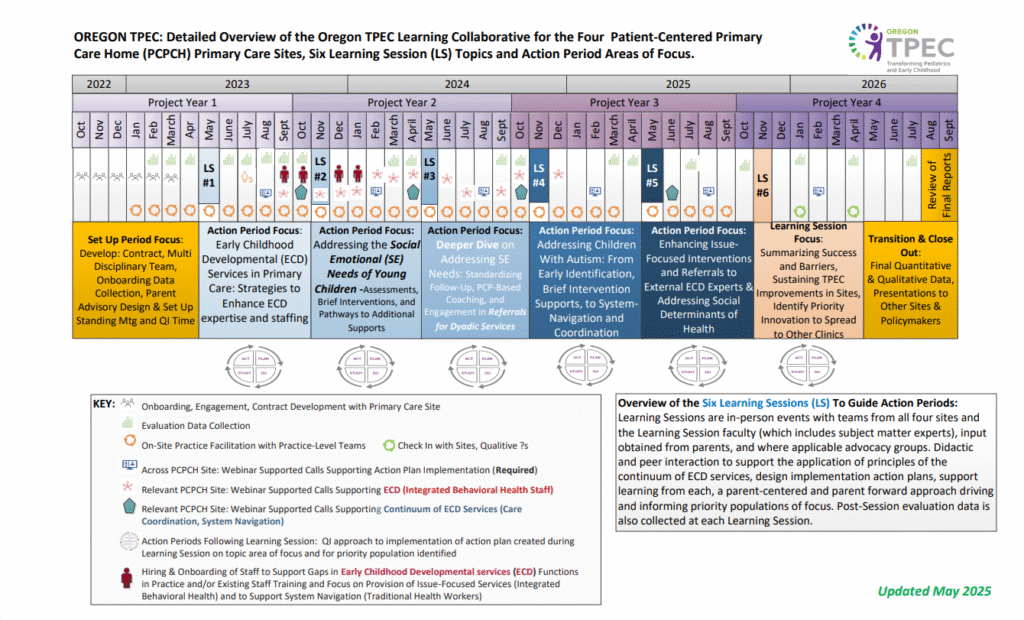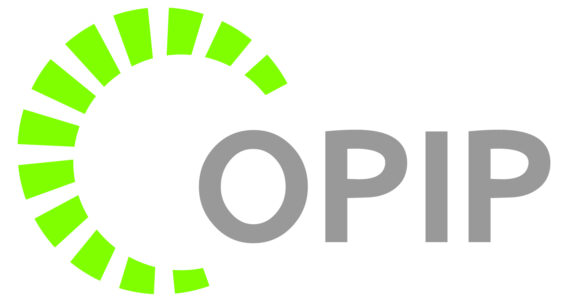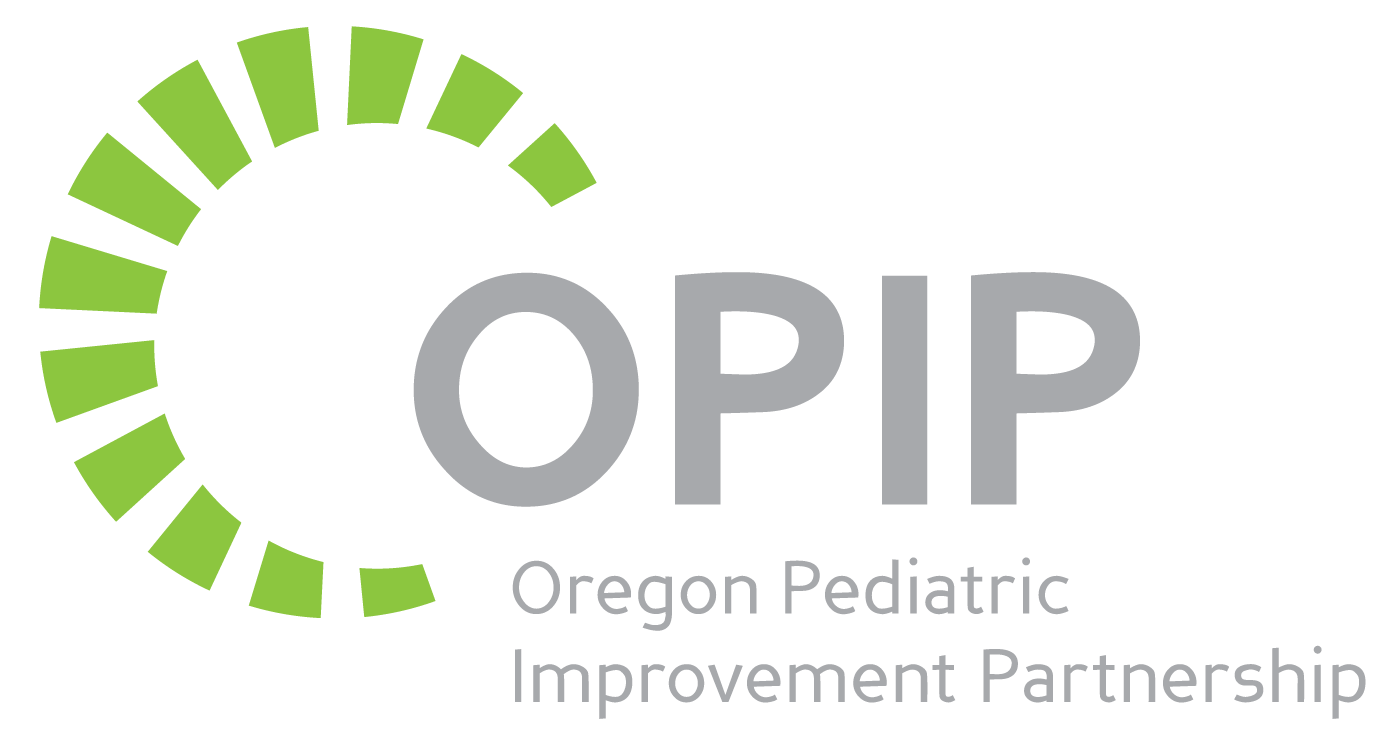OPIP has received funding from the Health Resources and Services Administration (HRSA) and Maternal Child Health Bureau (MCHB) for the Transforming Pediatrics for Early Childhood (TPEC) cooperative agreement. This four-year (September 2022-September 2026) initiative aims to improve equitable access to a continuum of early childhood development (ECD) services in primary care settings for children birth-to-five. It also seeks to strengthen the capacity of practices and the workforce to deliver high-quality ECD services that address the holistic needs of children and families. There has been a specific focus on increasing integrated behavioral health and other staff with behavioral expertise that can provide issue-focused interventions.
The Oregon TPEC model is centered on a high-fidelity Learning Collaborative of four diverse primary care pilot sites in the Portland Metro area- Hillsboro Pediatrics, Virginia Garcia Memorial Health Center (Cornelius Site), Randall Pediatrics Clinic, and Metropolitan Pediatrics (Johnson Creek Site). Collectively, these sites serve over 9,000 families with children birth-to-five. Through this Learning Collaborative, we aim to:
- Strengthen Early Childhood Development (ECD) expertise within primary care settings through enhancing the skill set of integrated behavioral health and other staff with behavioral expertise
- Enhance the continuum of ECD services provided in the practices
- Expand the knowledge and expertise of the primary care staff to better serve young children
Informed by our work with the pilot sites, we are collaborating with local leaders and stakeholders (including Health Share of Oregon) as well as state leaders and policymakers to identify opportunities for improving systems and policies to align with practice-level improvements.
This community-based approach, illustrated in Figure 1, is built on four key components:
- A Learning Collaborative with Patient-Centered Primary Care Home (PCPCH) sites, featuring learning sessions, facilitation support, and action periods (Blue section).
- Engagement of local system-level leaders and stakeholders responsible for services in the region (Yellow section).
- Engagement of state-level leaders and policymakers responsible for policies that impact region-specific systems (Green section).
- Development of tools and trainings to support the expansion of ECD service delivery beyond the pilot sites

Key Strategies Across Project Components:
- Integration of Early Childhood Development (ECD) experts into pediatric practices. This involves supporting staff hiring and/or development to become ECD experts, designing specific and effective workflows to maximize their impact, identifying sustainable solutions for retaining these experts, addressing policy and financing barriers, and aligning workforce needs with opportunities identified by practices. Each site has chosen to focus on integrated behavioral health staff to conduct issue-focused interventions and traditional health worker staff to support system navigation.
- Strategic data collection and application. We ensure that data indicators are thoughtfully gathered, analyzed, and used to drive improvement efforts. These indicators are strategically aligned with local and state policy initiatives, payment reform opportunities, and system-level levers.
- Expanding ECD expertise and service delivery. In 2024 we were contracted by Health Share of Oregon to support them in enhancing the social-emotional health of young children. As part of these efforts, we developed and led a Learning Collaborative for Integrated Behavioral Health providers. This initiative enhanced participants’ ability to provide assessments and interventions for children birth-to-five within primary care settings. Click here to learn more about this Learning Collaborative and the training materials. We also provided a training to primary care providers on social-emotional health for children birth-to-five and related strategies. Click here to learn more about the primary care provider training and materials.
Figure 2 provides a detailed description of the Learning Collaborative structure and methodology, outlining key activities and action periods. The four primary care pilot sites have actively participated in this Learning Collaborative beginning in 2023.

Overarching Goals of the Learning Collaborative:
The Learning Collaborative is designed to facilitate effective data collection, analysis, training, and implementation, ultimately leading to:
- Expansion of the ECD workforce. Increasing the number of ECD experts trained and placed in these pediatric settings that intentionally service children birth-to-five, with a focus on those insured through Medicaid/CHIP.
- Enhanced quality and accessibility of ECD services. Strengthening the continuum of ECD services provided in practice-level settings, particularly for children ages birth-to-five. This includes, but is not limited to, a focus on early social-emotional health, follow-up to developmental and social-emotional screening, screening for social determinants of health and connection to services, and the care coordination and linkage to services required for each topic area.
- Increased knowledge and competency among primary care staff. Equipping providers with the skills and expertise necessary to deliver high-quality and developmentally appropriate care.
- Across-site learning and knowledge sharing. Facilitating the sharing of learnings and insights across pilot sites, identifying both successes and challenges encountered in practice-level implementation, and community ECD service connections and capacity. Summaries of these findings will highlight strategies for sustainability, as well as service and workforce gaps to be addressed.
Materials from Previous Learning Sessions:
- Learning Session 1: 5/25/23
- Learning Session 2: 11/2/23
- Learning Session 3: 5/9/24
- Learning Session 4: 11/7/24
- Learning Session 5: 5/8/25
The Transforming Pediatrics for Early Childhood (TPEC) project is supported by the Health Resources and Services Administration (HRSA) of the U.S. Department of Health and Human Services (HHS) as part of an award totaling $3,991,229.00 with zero percentage financed with non-governmental sources. The contents are those of the author(s) and do not necessarily represent the official views of, nor an endorsement, by HRSA, HHS, or the U.S. Government. For more information, please visit HRSA.gov.

